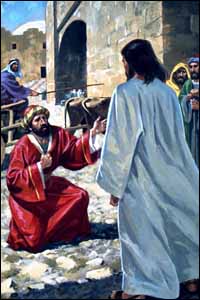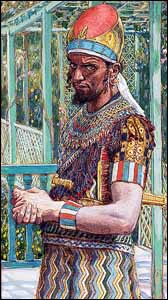
|
Old Testament
New Testament
Gospels
Acts
Paul's Letters
General Letters
Revelation
Topical Studies
Beginning the Journey (for new Christians). en Español

|
Old Testament
New Testament
Gospels
Acts
Paul's Letters
General Letters
Revelation
Topical Studies

|
Home
Bible Studies
Articles
Books
Podcasts
Search
Menu
Donate
About Us
Contact Us
FAQ
Sitemap
 The royal official implores Jesus to heal his son. Illustrator unknown. |
This lesson is relatively short, but contains some important lessons in faith.
Jesus Travels to Galilee (4:43-46a)
"43 After the two days he left for Galilee. 44 (Now Jesus himself had pointed out that a prophet has no honor in his own country.) 45 When he arrived in Galilee, the Galileans welcomed him. They had seen all that he had done in Jerusalem at the Passover Feast, for they also had been there. 46 Once more he visited Cana in Galilee, where he had turned the water into wine." (4:43-46a)
From Sychar Jesus moves into the southern districts of Galilee and arrives at Cana.
At first glance it seems strange that in verse 44 John recalls Jesus' comment that a prophet has no honor in his own country (patris[184]), and in the very next sentence says that the Galileans welcomed him.
In John's Gospel, Jesus has seen growing opposition in Judea (4:1-3), prompting him to travel to his home area of Galilee. But John is warning the reader not to expect sudden acceptance even in Galilee. It won't be like the acceptance he had experienced in Sychar. As we'll see in verse 48, the Galilean's belief in him was largely based on his miraculous signs, not in recognizing who he was. Just because Jesus is a Galilean doesn't mean they'll see Jesus for who he is, any more than the Judeans had. Nevertheless, Jesus initial welcome in Galilee was quite positive, since the Galileans knew of the miracles Jesus had performed in Jerusalem at Passover.
The Royal Official's Son (4:46b-47)
 James J. Tissot, 'Herod' (1886-94), gouache on board, 6-3/16x3-3/16 inches, Brooklyn Museum, NY. |
John has set the scene. Now he introduces the desperate need that Jesus meets in Cana. A man's son is burning up of a fever and is nearly dead.
"And there was a certain royal official whose son[185]lay sick at Capernaum. 47 When this man heard that Jesus had arrived in Galilee from Judea, he went to him and begged him to come and heal his son, who was close to death." (4:46b-47)
Jesus has been in Cana for several days -- long enough for word to reach Capernaum that Jesus was back in Galilee. Immediately upon hearing that Jesus is in Cana, an important man with a dying son rushes up the road from Capernaum to Cana, a distance of about 20 miles, and a rise from the Sea of Galilee of about 1,250 feet (382 meters), a good two days' journey on foot -- probably less on horseback, since this man was a wealthy official. He would probably have gone south west from Capernaum along the lake, then at Tiberius up the road into the mountains to Cana.[186]
This resident of Capernaum is an official in service of Herod Antipas (reigned 4 BC to 39 AD), tetrarch of Galilee and Perea, and considered a king or "royal" by the populace.[187]Herod Antipas was a builder, and during his long reign had built his capital of Tiberius, on the western shore of the Sea of Galilee.[188] We know of two early believers who had connections with Herod: Joanna, whose husband Chuza managed Herod's household (Luke 8:3) and Manaen, who had been brought up with Herod (Acts 13:1). Perhaps one of these is the "royal official" whose son Jesus healed -- we just don't know.
The Faith of the Royal Official (4:47-50)
The royal official had probably heard Jesus when he had come to Capernaum previously (2:12). He has seen him do miracles of healing there (Luke 4:23; Matthew 11:23). He is desperate! He knows Jesus can heal his son, but he must find the Master. His faith is based on the miracles he has seen, but it is strong enough to sustain him on a two-day mountainous journey.
So now he comes to Jesus and implores him to help.
"He ... begged[189]him to come[190]and heal[191]his son, who was close to death." (4:47b)
The verb is in the imperfect tense, which means that he asked and kept on asking. He didn't stop or take "No" for an answer.
Jesus' first response is a rebuke not just of the official's faith, but of all the Galileans, who were more interested in signs and wonders rather than in who Jesus actually was.
"Unless you people[192]see miraculous signs and wonders,' Jesus told him, 'you will never believe.'" (4:48)
But the man refuses to be denied. He is persistent.
"49 The royal official said,
'Sir, come down before my child dies.'
50 Jesus replied, 'You may go. Your son will live.' The man took
Jesus at his word and departed." (4:49-50)
Jesus responds with a command and a statement: "Go, your son lives," which is more accurate than most translations that say "will live." The present imperative emphasizes a word of power, a healing word, and underscores the continuing power of life that Jesus brings.[193]
The man's response shows his faith. Instead of pestering Jesus to come with him, he believes that Jesus has already healed his son. "He took Jesus at his word" (NIV) is an English idiom for the more literal, "He believed the word that Jesus spoke to him" (NRSV, ESV).
Q1. (John 4:43-48) Many of the Galileans believe mainly
because they have seen miracles. In what ways do miracles help build faith? Why
does only seeing miracles not build a mature faith? Why does Jesus rebuke the
Galileans in 4:48?
https://www.joyfulheart.com/forums/topic/1428-q1-maturing-faith/
Q2. (John 4:43-50) What do we learn about the royal
official's faith from his actions? Why did he travel 20 miles from Capernaum to
Cana? What does this say about his faith? When he departs for home and "takes
Jesus at his word," what does this tell us about his faith?
https://www.joyfulheart.com/forums/topic/1429-q2-royal-officials-faith/
Confirmation of the Time (4:51-54)
So the official heads down the mountain to return to Capernaum, and while on his way home, meets some of his servants who bring a joyous message.
"51 While he was still on the way, his servants met him with the news that his boy was living. 52 When he inquired as to the time when his son got better, they said to him, 'The fever[194]left him yesterday at the seventh hour.' 53 Then the father realized that this was the exact time at which Jesus had said to him, 'Your son will live.' So he and all his household believed." (4:51-53)
When this father gets over his initial shock that his son is healed, he finds out that the time of the boy's healing -- about 1 pm -- was just the time that Jesus had spoken the word of healing.
As a result, the man and all his extended household (oikia[195]) -- immediate family, extended family, and servants -- become believers. His faith had begun with seeing miracles, but it has gone deeper. He believes Jesus' word and later sees the results.
I don't doubt that Jesus (and John) got the full story when they arrived in Capernaum later on this trip to Galilee, and John recalled it decades later to include in his Gospel.
John saw special significance in this healing, as a sign pointing to who Jesus is -- the man who can heal at a distance by only a word. The first sign John pointed out was the changing of the water into wine (2:11) -- also in Cana.
"This was the second miraculous sign[196]that Jesus performed, having come from Judea to Galilee." (4:54)
Q3. (John 4:53) What are the factors that caused the
royal official's household (immediate family, extended family, and servants) to
believe? How mature was this faith initially? How do you think the royal
official was able to nurture it beyond mere "miracles faith"?
https://www.joyfulheart.com/forums/topic/1430-q3-household-faith/
Parallels with the Healing of the Centurion's Servant
Some scholars have concluded that John's account of the healing of the official's son is another version of the Synoptic's account of the healing of the centurion's servant (Matthew 8:5-13; Luke 7:2-10). In both accounts, you have an official personage who has faith for healing from a distance.
However, the stories have a number of differences:
- The centurion was a Gentile, the royal official likely a Jew.
- The centurion's slave was paralyzed, while the son had a fever.
- The centurion meets Jesus in Capernaum, while the royal official finds him in Cana.
- The centurion's faith is praised by Jesus, while the royal official's faith is rebuked as deficient.
- The centurion urges Jesus not to come, while the royal official does urge Jesus to come.
I think it's fair to say that strong evidence suggests that the healing of the royal official's son is a different healing than that of the centurion's slave.
Lessons for Disciples
 Entire study is available in paperback, Kindle, and PDF formats. |
What are we supposed to learn from this account? I think there are several lessons:
- You can't expect your closest family, friends, or countrymen to appreciate you as a godly leader -- "a prophet has no honor in his own country" (4:44).
- Faith based on miracles alone is deficient (4:45, 48). Faith that is praise-worthy is based on who Jesus actually is: faith in his word and authority.
- We must sometimes take Jesus at his word and act before seeing the result.
Q4. Have you read of miracles accompanying a great
harvest of new believers on the missions fields in our day? What place do
miracles have in evangelism today -- both in your country and abroad? Why do some
denominations in our day deemphasize miracles or claim that they were only for
the early church? Why do some denominations emphasize miracles? Which of these
types of denominations tend to grow faster? What kind of "discipling" is
necessary for those who come to Christ primarily on the basis of miracles?
https://www.joyfulheart.com/forums/topic/1431-q4-miracles-and-evangelism/
Prayer
Father, thank you that you even honor a small amount of faith. Help us to believe you for more than we do now. Grow our faith. Help us to learn to take you at your word and take actions even when we don't see immediate results. Grow us up in you. We pray in Jesus' name. Amen.
Key Verses
"Jesus replied, 'You may go. Your son will live.' The man took Jesus at his word and departed. While he was still on the way, his servants met him with the news that his boy was living." (John 4:50-51, NIV)
Endnotes
[184]Patris, literally, "of one's fathers" can refer to "a relatively large geographical area associated with one's familial connections and personal life, fatherland, homeland," or to the locale of one's immediate family, "hometown, one's own part of the country" (BDAG 788, 1). In the Synoptic Gospels, the context of this saying is in Jesus' hometown of Nazareth, though the same word (patris) occurs in both John and the Synoptics.
[185]"Son" in verses 46 and 47 is not the word for child, but paidion, a term more expressive of affection, as Barclay puts it, "my little lad" (Morris, John, p. 291, fn. 114).
[186]Kafr Kanna is about 343 m. elevation. Capernaum at Galilee is -39 m., a difference of 382 m. or 1,250 feet elevation.
[187]"Royal official" (NIV, NRSV), "official" (ESV), "nobleman" (KJV), is basilikos, "royal." The "royal" of John 4:46, 49 could be a relative of the royal (Herodian) family. (BDAG 170).
[188]He also had major building projects at Sepphoris and Betharamphtha. He was given the fortified palace at Machaerus, built by Herod the Great, on the east side of the Dead Sea, where Josephus says that John the Baptist was imprisoned and later executed.
[189]"Begged" (NIV, NRSV), "besought" (KJV), "asked" (ESV) is erōtaō, "ask a question," then "to ask for something, ask, request." (BDAG 395, 2). It is in the imperfect tense -- past tense continuing action.
[190]"Come" is katabainō, "to move downward, come/go/climb down" (BDAG 514, 1aβ).
[191]"Heal" is iaomai, "to restore someone to health after a physical malady, heal, cure" (BDAG 465, 1).
[192]Oida, "to see" is in the plural, translated by the NIV "you people."
[193]"Will live" (NIV, NRSV, ESV) is more accurately, "lives" (KJV), present tense.
[194]"Fever" is pyretos, "fiery heat," here, "fever" (BDAG 899).
[195]Oikia, "social unit within a dwelling, household, family" (BDAG 695, 2).
[196]Some have seen John as drawing from a Book of Signs, but there seems little evidence of it outside of these two references.
Copyright © 2026, Ralph F. Wilson. <pastor![]() joyfulheart.com> All rights reserved. A single copy of this article is free. Do not put this on a website. See legal, copyright, and reprint information.
joyfulheart.com> All rights reserved. A single copy of this article is free. Do not put this on a website. See legal, copyright, and reprint information.

